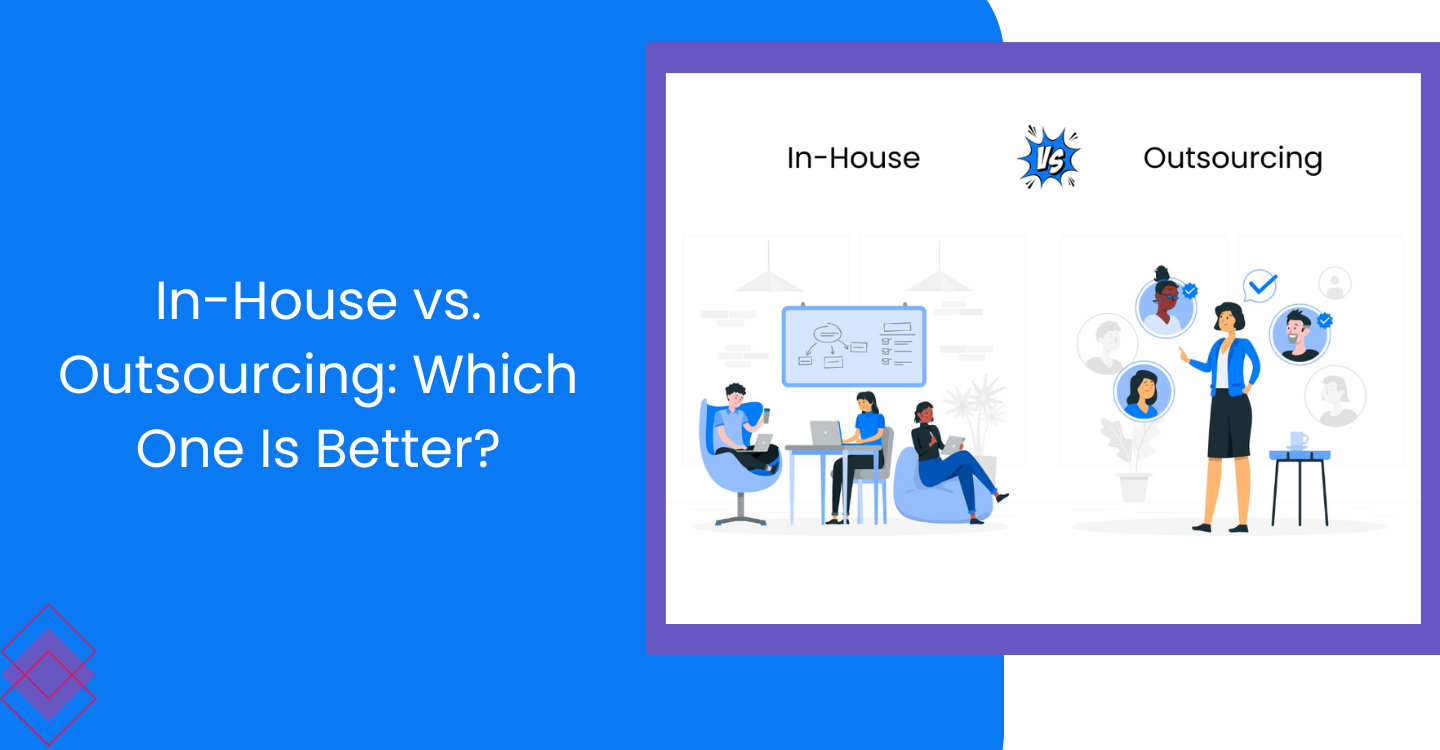Are you struggling to decide on a development team, torn between opting for an in-house team or outsourcing the development work? We’re here to provide comprehensive answers and simplify this decision-making process for you, making it easier to choose between in-house and outsourced development teams.
Both options have their merits, depending on your specific requirements, business needs, and objectives. Consider whether your project is of a long or short-term nature, explore the potential for scaling up your product, and, most importantly, evaluate your budget.
Before arriving at a decision, it’s crucial to ask yourself these key questions. This article will delve into the distinctions between in-house development and outsourcing, outlining the respective pros and cons. By the end, you’ll have a clear understanding of which option is more beneficial for your business. Let’s get started!
What is In House Development?
In-house development involves establishing a dedicated team within your company rather than outsourcing to external agencies for developers. This entails building and nurturing your own team of developers from the ground up, including the recruitment of candidates for specific positions. Adopted by major corporations such as Amazon and PayPal, this model allows for comprehensive oversight and control over projects, albeit at a higher cost.

Opting to hire an in-house development team is akin to bringing permanent staff on board for your company. Establishing a robust in-house development team involves several essential steps, including recruitment, interviews, and onboarding. If your primary focus is on IT products, hiring in-house can prove beneficial, albeit at a higher cost, as it allows for greater control over the project.
Pros Of In-House Development
- Team prioritizes the company’s goals and culture: Numerous successful companies boast an in-house development team that closely collaborates with the company, understanding its core values. In this working model, companies can handpick team members who align with their culture. A thriving team, embodying the company’s core values, propels successful companies forward. Through in-house development, you have the flexibility to select team members in harmony with your startup culture. Collaborative teamwork yields superior outcomes, a facet lacking when outsourcing your project.
- Direct communication is a core benefit: If a company opts for an in-house team, the team works exclusively for your company, and often, its members operate in a physical office setting. This working arrangement minimizes the likelihood of email miscommunications within the team, facilitating direct and uninterrupted face-to-face conversations. This seamless communication allows for swift decision-making, particularly when determining project requirements, as everyone can engage in high-speed discussions.
- Immediate support is a privilege that comes with in-house development: If a new product is deployed, it often gives rise to various issues that need prompt resolution. All necessary fixes were promptly implemented without further delay. In contrast to an outsourced team, communication tends to slow down as the team is simultaneously engaged in different projects.
Cons Of In-House Development
- It’s costly: If you opt for an in-house development team, be prepared to cover the hidden costs associated with hiring such a team. According to Payscale, the average salary for an IT developer in the US region is approximately $71,508. This figure does not encompass additional expenses such as sick leave, vacations, social security, insurance, and the onboarding process for each candidate you bring on board.
- The turnover rate can be high: Recruiting top talent for your company may not be challenging, but in the realm of IT experts, the demand is so high that other companies are constantly vying for their attention, attempting to lure them away. This necessitates offering competitive compensation to ensure they remain committed to your organization. Whether it involves providing additional benefits or acknowledging that retaining such talent comes at a cost, the choice lies between investing adequately or potentially losing valuable team members.
What Is Outsourced Development?
In contrast to in-house development, outsourced development involves entrusting the product establishment process to an external agency. Notably, within the outsourced market, IT services account for 72% of the total value of worldwide outsourcing contracts, as reported by ISG.

The company opted for outsourced development due to its cost-effectiveness and scalability, distinguishing it from in-house working methods. This represents an ever-evolving trend, with global IT outsourcing generating $66.5 billion in 2019. Notably, Google and Slack are renowned companies that have outsourced their IT development departments.
Benefits of Outsourcing
- Better Control Over Cost: If you operate in a country where local talents are expensive, consider outsourcing your project. Transition to the IT sector where salaries are comparatively lower while maintaining a similar level of expertise. Eastern European countries are renowned as top destinations for IT outsourcing projects.
- A large pool of talents: When outsourcing your company project, you are not confined to working with a limited number of candidates in your district; instead, you will have access to a diverse pool of talents, providing you with numerous options to choose from.
- No technology hurdles:Certain projects demand a diverse set of skills, making it challenging to locate individuals possessing all the necessary expertise within a specific district. Nevertheless, you have the option to collaborate with several IT firms that excel in a variety of technologies essential for constructing the solution.
Disadvantage of Outsourcing
- No complete control: An outsourced team, unlike an in-house team, not only concentrates on your project but also manages multiple projects for various companies. This implies that you have limited control over the development, progress, and troubleshooting of your project. Without direct contact with your team, staying informed about your project’s status becomes challenging, and resolving issues may require the processing of an email to address and fix bugs.
- Communication barrier: Coordinating a mutually convenient meeting becomes challenging when the outsourcing team operates in a different time zone, primarily due to the time zone variances. Additionally, language differences may pose a challenge if the leader of the outsourced team struggles to fully comprehend your situation.
Final Words!
In conclusion, a comparison of the pros and cons between in-house development and outsourcing reveals that outsourcing presents several advantages, making it a safer and more reliable choice for various businesses.
Primarily, cost efficiency plays a pivotal role in favor of outsourcing. Companies can tap into a broad talent pool, benefiting from experienced professionals who offer competitive pricing. Additionally, outsourcing provides companies with a plethora of options, allowing them to choose from numerous service providers proficient in different technologies.
Moreover, outsourcing grants access to a diverse range of expertise and skills. Companies can select from various outsourcing partners specializing in different technologies and industries, ensuring the availability of the right talent for their specific project requirements.
While it is true that an in-house development team provides maximum control and proximity, it comes with a substantial cost in terms of salaries and staff retention. Although outsourcing may introduce communication challenges and reduced control, it compensates with cost-effectiveness, scalability, and access to an extensive talent pool.
Nextupgrad stands out as one of the premier outsourcing service providers, boasting proficiency, experience, and a talented workforce with decades of service. If you have tasks on your plate, consider entrusting them to us and reach out for further assistance.




